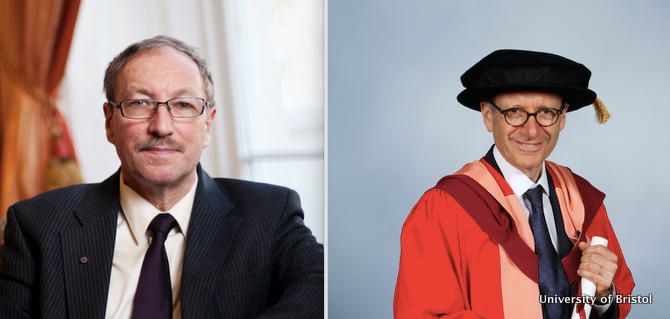Professor Stephen Sparks FRS CBE (volcanology) and Professor Bernard Silverman (statistics) have been awarded knighthoods in the Queen’s New Year Honours list.
Professor Stephen Sparks is regarded as a leading authority on volcanology and risk associated with natural hazards and is Professor of Geology in the University’s School of Earth Sciences and a member of the Cabot Institute.
Sir Stephen’s research around risk assessment for natural hazards has improved the ability to foresee deadly eruptions and he has been awarded the highest possible awards in the fields of geological and earth sciences from the Geological Society of London, European Geosciences Union, Geological Society of America and American Geophysical Union.
In 2015 he was the recipient of the 2015 Vetlesen Prize (regarded as the equivalent of the Nobel Prize for Earth Sciences).
Sir Stephen said: ‘I am absolutely thrilled to receive the honour which recognises the importance of geology and environmental sciences for stewardship of the Earth and making sure of a sustainable future.’
Professor Hugh Brady, Vice-Chancellor and President of the University of Bristol, added: ‘On behalf of the University I would like to extend huge congratulations to Stephen on this prestigious and well-deserved honour. This is a very proud day for Bristol.
‘Stephen has dedicated his life to developing our understanding of volcanoes and his ground-breaking risk assessment work has undoubtedly saved countless lives and communities at risk of volcanic eruption.’
Bernard Silverman is Emeritus Henry Overton Wills Professor of Mathematics at the University of Bristol and lately Chief Scientific Adviser to the Home Office. He is a statistician whose research has ranged widely across theoretical and practical aspects of statistics.
He is recognised as a pioneer of computational statistics, researching the ways that computing power has changed our ability to collect, analyse, understand and utilise data.
Having studied Mathematics and then Statistics at Cambridhe University, he co-designed the first pocket programmable calculator, the Sinclair Cambridge Programmable.
He went on to senior academic and leadership posts at the universities of Bath, Bristol and Oxford, as well as visitor posts at various American universities.
From 2010 to 2017 he worked full time as Chief Scientific Adviser to the Home Office. His role was to provide and facilitate scientific advice on all aspects of Home Office policy and operations to the Home Secretary, ministers and officials, to lead research and science within the Home Office, and to build relationships within and outside Government including internationally. He is now freelance, with roles including research, charity trusteeship, consultancy, and advice to Government.
His main research activity is in modern slavery, building on his work for the Home Office in producing the first scientific estimate of the prevalence of modern slavery in the UK. His estimate of 10,000 to 13,000 victims played a pivotal role in the launch of the strategy leading to the Modern Slavery Act 2015, and he is now involved in developing the methodology further and in applying it world-wide.
His other current main interest is in security, as chair of the Technology Advisory Panel, set up under the provisions of the Investigatory Powers Act 2016 to give specialist advice to the senior judges who provide independent oversight of the use of investigatory powers by intelligence agencies, police forces and other public authorities.
He has been awarded the honorary degree of Doctor of Science by the Universities of St Andrews, Lancaster, Bath and Bristol.
Are there any other Bristol staff members you think deserve knighthoods? Let us know:







